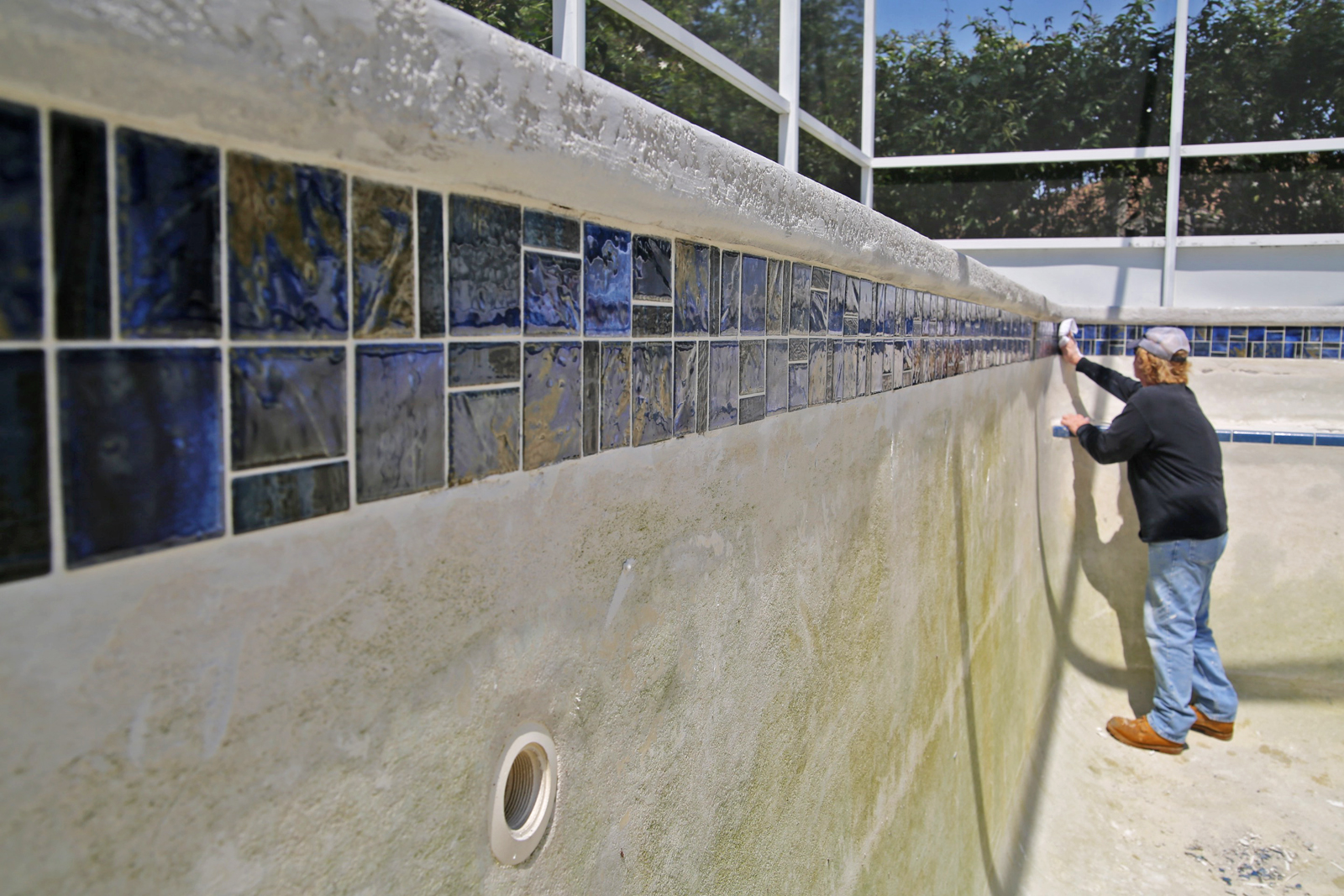Dealing with cracks in a concrete swimming pool is inevitable but might not always be a catastrophe and could be even done without emptying the pool with the right knowledge and products. How to repair a crack in a concrete swimming pool?
Identify the type of Swimming Pool Crack:
- Clean the crack thoroughly
- Apply hydraulic cement or epoxy filler
- Use a putty knife to smooth surface
- Allow drying completely
- Apply waterproof sealant
- Let sealant cure according to instructions
- Refill the pool & monitor for leaks
- Use professional help for severe cracks
Swimming pool cracks are a common occurrence. Driveways and sidewalks also crack and for many of the same reasons. When any heavy structure is built on the ground, the ground shifts and settles beneath it over time. Even though we may not feel it, the earth moves and those subtle movements can eventually lead to cracks forming.
Introduction:
Repairing a crack in a concrete swimming pool is essential to maintain its structural integrity and prevent water leakage. Cracks in a pool can worsen over time if left untreated, leading to costly damage and potential safety hazards. Fortunately, with the right materials and techniques, it’s possible to effectively repair these cracks and restore the pool’s functionality. In this guide, we’ll explore the steps involved in repairing a crack in a concrete swimming pool, ensuring a successful and long-lasting solution. From preparation and patching to sealing and monitoring, each step plays a crucial role in the repair process. By following these instructions carefully, you can tackle the repair project with confidence and enjoy a leak-free swimming pool once again.
Understanding the Causes of Swimming Pool Cracks
Diving into the nuances of concrete swimming pools, it’s pivotal to grasp why swimming pool cracks manifest, an understanding essential for effective pool crack repair. These fissures, ranging from superficial concrete cracks to threatening structural disruptions, can significantly undermine the integrity and safety of pools.
Typically, the genesis of cracking in cement-based pools might be due to several factors.
- thermal expansion and contraction of concrete, as seasons change, often lead to cracking.
- geological issues, such as soil settlement or movements, exert stress on the pool’s structure and, over time create cracks.
Leaking concrete not only signifies a loss of water but can escalate into more severe complications if not addressed promptly. Regular maintenance checks can help detect early signs of cracking, thus mitigating extensive damage.
Also, construction flaws during the initial setting of concrete or inadequate curing can initiate hairline cracks, which might expand over time. By acknowledging these causative elements, pool owners are better prepared to undertake necessary pool crack repair actions. Ensuring that the cement foundation and surrounding soil are stable can significantly reduce the likelihood of cracking and subsequent leaking, preserving the longevity and aesthetics of concrete swimming pools.
Types of Swimming Pool Cracks
What Causes Pool Cracks in Concrete Swimming Pools
Discerning the causes of pool cracks in concrete swimming pools is crucial for any effective crack repair strategy. Typically, these bothersome cracks can result from several variables. One common culprit is the natural settling or shifting of the soil beneath the pool, which puts uneven pressure on the concrete structure.
Over time, these pressures can lead to structural cracks that compromise the integrity of the swimming pool. Furthermore, extreme temperature changes can cause the concrete to expand and contract, a process known as thermal cracking, which again can lead to visible cracking.
Another factor could be poor construction practices when the pool was initially built. If the concrete mix was incorrect or if it wasn’t allowed to cure properly, weaknesses could manifest as cracks later on. Concrete pools need to be constructed with precision to avoid such pitfalls.
Additionally, the chemical balance of the water plays a role. Highly acidic or basic water can erode the concrete, exacerbating small cracks into larger leaks that require more extensive concrete repair.
Understanding these causes not only helps in effective leak sealing but also aids in determining whether a crack needs to be simply repaired or if it beckons for more major interventions, like addressing structural cracks professionally. Identifying the root cause is the first step towards ensuring your swimming pool remains a venue of joy and not a constant source of worry and expense due to ongoing repairs.
Steps for Easy Swimming Pool Crack Repair

If you’ve discovered a cracked concrete pool in your backyard oasis, fear not! Pool crack repair can be a straightforward process if you approach it methodically. First off, it’s crucial to understand how to repair these vexing issues effectively. For surface cracks in your swimming pool, a simple crack injection technique may suffice. This method involves injecting a sealant into the crack, ensuring it’s both water-tight and less likely to repair further damage.
For more substantial issues, such as a leaking concrete foundation, a more robust concrete repair strategy will be necessary.
Typically, leak sealing comes into play when dealing with cracks that have led to water loss. Utilizing specialized repair products you can address these leaks and prevent water from undermining the structural integrity of your swimming pool.
When considering repair products, ensure they’re suitable for a concrete pool, which will provide a long-lasting remedy to the problem of a cracked, potentially leaking concrete structure. If DIY seems daunting or if the crack appears severe, consulting a professional might be your best course of action. Remember, a well-maintained pool can save lots of time and money in the long run, avoiding frequent needs to repair or overhaul the entire swimming facility.
How to Fix a Cracked Pool: Simple DIY Pool Concrete Repair

Looking into the world of DIY pool maintenance, particularly when you’re faced with the daunting task of fixing a cracked pool, may initially seem like a herculean endeavor. However, understanding how to repair cracks in concrete swimming pools can drastically extend the lifespan of your oasis.
Assuming you’ve already familiarized yourself with the causes of swimming pool cracks, which we previously explored, it’s time to dive into the repair process itself. The first step is to select the right repair products designed specifically for swimming pools, ensuring they’re suitable for handling the particular type of cement and environmental stresses involved.
Concrete swimming pools are notorious for minor cracks that, if ignored, can evolve into more significant structural problems, necessitating complex solutions like replacing sections of the pool. To begin the crack repair, clean out the cracked area thoroughly to remove any debris or algae that might interfere with the adhesion of the pool repair materials.
Then, using a high-quality cement-based sealant, carefully fill in the cracks, making sure to follow the product’s instructions regarding application and curing time. It’s important to address even the smallest cracks immediately; repairing cracks in concrete swimming pools at the earliest can save you immense time and resources in the future.
Once you’ve applied the repair products, monitoring the repaired area for any signs of further movement or cracking is crucial. If you observe significant changes, that might suggest underlying issues that require professional intervention. Looking ahead, we’ll delve deeper into addressing more severe cracks and the importance of hiring a pool repair expert for intricate situations.
Addressing More Severe Cracks
When it comes to repairing concrete pools, addressing structural cracks is a critical challenge that demands a methodical approach. Unlike superficial fissures, structural cracks in concrete can jeopardize the pool’s integrity and safety.
To tackle these serious issues, crack injection techniques are often recommended. This method involves injecting a sealant into the crack under pressure, ensuring that the crack is filled and sealed from any further damage.
For many do-it-yourself enthusiasts looking to handle pool repair by themselves, understanding the nuances of repairing deeper cracks is essential. It’s a tough job, but with patience and the right materials, it’s achievable.
However, it’s crucial to evaluate whether the crack is indicative of more significant underlying issues. In some cases, the formation of a structural crack in a concrete pool may suggest problems with the soil conditions or inferior construction methods, which might require professional assessment. For anyone facing substantial structural cracks consulting an expert in pool repair before attempting a fix is advisable to ensure the long-term health of your swimming oasis.
Here’s a structured table detailing how to address more severe cracks in a concrete swimming pool:
Repairing Structural Cracks in Concrete Swimming Pools
When confronted with structural cracks in your swimming pool, it is essential to approach concrete crack repair with precision and care. Structural cracks in concrete swimming pools can pose serious problems if not properly addressed. Repairing these types of cracks is not just about aesthetics; it is about ensuring the structural integrity of your swimming pool.
Here is how to repair these daunting issues effectively. First, identify whether the crack you’re dealing with is merely superficial or if it penetrates deeper, indicating a more severe issue, like leaking concrete.
For straightforward pool crack repair, start by cleaning out the crack thoroughly to remove any debris or loose material, ensuring the repair material adheres well. Next, using a quality concrete repair product is crucial; choose one specifically designed for swimming pools to withstand constant exposure to water and chemicals. Apply the repair material following the manufacturer’s instructions closely this can often involve inserting a bonding agent, and then filling the crack with a repair compound designed for pool use.
Once repaired, it’s vital to monitor the area to ensure the problem doesn’t recur. A properly repaired crack shouldn’t show signs of leakage, and the fix should blend seamlessly with the surrounding area, maintaining the pool aesthetic. Regular maintenance checks are also advisable to preempt future issues, keeping your swimming pools in prime condition. Remember, addressing structural and pool crack repairs promptly can save you from more significant repairs down the line.
When to Seek Professional Pool Repair Services
While tackling minor issues in your swimming pool with DIY methods can be practical, certain situations necessitate enlisting a pool repair expert. Knowing when to seek professional pool repair services is crucial to ensure the longevity and safety of your pool. It’s advisable to consult a professional when the swimming pool cracks are wide, or deep, or if the pool’s structure appears compromised. These types of cracks may indicate underlying problems that simple repair products can’t adequately address.
Complex issues, such as structural damage within the concrete, require a thorough assessment by an expert who can determine the best method to repair or replace the damaged area effectively. When repairing these severe types of damage, it’s crucial to ensure that the fix will hold and that all areas are properly sealed, safeguarding the pool against future problems. A professional will have access to high-grade materials and techniques that are not typically available to the average homeowner.
If you’ve previously attempted to repair minor cracks but find they reoccur or worsen, this is a clear sign that professional services are required. Pool repair experts specialize in assessing all types of damage and selecting the most effective solutions, ensuring that repairs are durable and restore the full functionality of your pool.
Why Hire a Pool Repair Expert to Fix Cracks in Your Inground Pool
While you’ve learned about the various causes and DIY solutions for fixing swimming pool cracks, when it comes to your concrete swimming pools, sometimes it’s best to rely on a pool repair expert. A professional can assess whether your pool is experiencing surface-level cosmetic issues or deeper, structural damage. They possess the technical skills and tools to repair, seal, and replace areas of your pool expeditiously and safely.
Performing pool crack repair yourself can provide a temporary fix, but without expert intervention, you might miss hidden damages that could compromise your pool’s integrity in the long run. Spotting and repairing swimming pool cracks early by hiring a pool repair expert is essential in preventing future, more costly damages. Specialists in pool repair come with a keen eye for detail and understand how to handle various types of pool materials, ensuring that fixes are not only effective but also lasting.
They’ll analyze the cracked, deteriorated sections of your swimming pool, ensuring that all issues are addressed, from simple seal fixes to replacing compromised sections of the pool structure. This proactive approach can save you money and time, averting significant interruptions during swim seasons. So, when contemplating whether to fix your swimming pool cracks yourself or hire an expert, consider the long-term benefits of professional pool repair to maintain your swimming oasis in peak condition.
Conclusion:
In conclusion, repairing a crack in a concrete swimming pool is a manageable task with the appropriate tools and methods. By addressing cracks promptly, pool owners can avoid more extensive damage and costly repairs in the future. A well-executed repair not only restores the pool’s structural integrity but also ensures a safe and enjoyable swimming experience for years to come. Regular maintenance and inspection can help identify and address any new cracks or issues before they escalate. With diligence and proper care, a concrete swimming pool can remain a source of relaxation and recreation for its owners.
References:
SwimBlog- How to Fix Swimming Pool Cracks
FAQ’s
- Why do concrete swimming pools develop cracks? Concrete pools can develop cracks due to various factors such as ground movement, temperature fluctuations, improper construction, or settling over time.
- How can I tell if a crack in my pool is serious? Serious cracks often exhibit signs of widening, lengthening, or depth. Additionally, if you notice water loss or structural instability, it’s crucial to address the crack promptly.
- Can I repair a crack in my pool by myself? Minor cracks can often be repaired by homeowners using appropriate materials and techniques. However, for more severe cracks or structural issues, it’s advisable to seek professional assistance.
- What materials do I need to repair a crack in a concrete pool? Materials commonly used for pool crack repair include hydraulic cement, concrete patching compound, epoxy injection kits, waterproof sealants, and reinforcing materials like rebar or mesh.
- How long does it take to repair a crack in a concrete pool? The time required for repair depends on the severity of the crack and the chosen repair method. Simple patching may take a day or two, while more extensive repairs involving structural reinforcement can take longer.
- How do I prevent cracks from forming in my pool in the future? Regular pool maintenance, including proper water chemistry management, routine inspections, and addressing minor issues promptly, can help prevent cracks from forming. Additionally, ensuring proper construction and reinforcement during initial installation is crucial.
- Is it necessary to drain the pool to repair a crack? In many cases, it’s possible to repair cracks without draining the entire pool. However, for certain repair methods or severe cracks, partial or complete draining may be necessary.
- Can I use pool crack repair kits available in hardware stores? Pool crack repair kits can be effective for minor cracks. However, it’s essential to follow the manufacturer’s instructions carefully and assess whether the kit is suitable for the specific type and severity of the crack.
- How long will the repair last? The longevity of the repair depends on various factors such as the quality of materials used, the effectiveness of the repair method, and ongoing maintenance. With proper care and maintenance, a well-executed repair can last for many years.
- Should I hire a professional for pool crack repair? For complex or severe cracks, hiring a professional pool repair specialist is advisable. They have the expertise, experience, and specialized equipment to assess the situation accurately and implement effective repairs.


:max_bytes(150000):strip_icc()/3509673328_9b7ed82212_b-5705a84d3df78c7d9e953054.jpg)


